
The son of a woman who died by suicide in a hospital claims he gave a nurse “clear evidence” that his mother was planning to end her life just hours before her death. Christopher MacRae confiscated the item, handed it to the nurse, and urged him to search his mother’s room for other potential risks. However, the search was never conducted, and Dr. Sara MacRae, a former psychiatrist, took her life in her room at the Royal Edinburgh Hospital (REH) in March 2020.
NHS Lothian has since apologized to the MacRae family and made improvements in its processes for assessing patient risks following her death.
The door to Dr. MacRae’s room had been flagged as a “high risk” for suicide attempts a year before her death, but it was not replaced. A £5 million project to upgrade all bedroom doors at the REH, described as “urgent” in 2022, has yet to begin.
Christopher, 30, who had been his mother’s primary carer during her decades-long battle with mental illness, expressed his frustration. “For over four years, my family has been left in the dark about what really happened that day,” he said. “I handed over the object, knowing my mother intended to use it to end her life. I trusted the staff to protect her, but they failed to do so.”
He added, “I took my mum to the hospital, believing it was the safest place for her. But on the day she died, she was worse than when she arrived.”
An internal review by NHS Lothian found that the way the case was handled directly impacted the level of harm. The incident is now part of a fatal accident inquiry (FAI).
The BBC Scotland investigation revealed several failures, including:
- A safety briefing for staff on Dr. MacRae’s ward, which was not completed until four weeks after her death
- Ward staff being unaware of her previous suicide attempts
- A nurse admitting it was a mistake not to take Christopher’s warnings more seriously and search Dr. MacRae’s room
Dr. MacRae, who had schizoaffective disorder, had been hospitalized for six weeks before her death. She was mandated to the Royal Edinburgh Hospital due to her worsening mental health, a struggle that began in the 1990s.
Christopher, who visited his mother twice daily, had a routine of making her promise she would see him the next day. He recalled, “For 26 years, she would always say, ‘Don’t worry, I’ll be here tomorrow, I just need to get through the night.’ But that day, she told me she couldn’t promise, and it was the hardest thing I’ve ever heard.”








